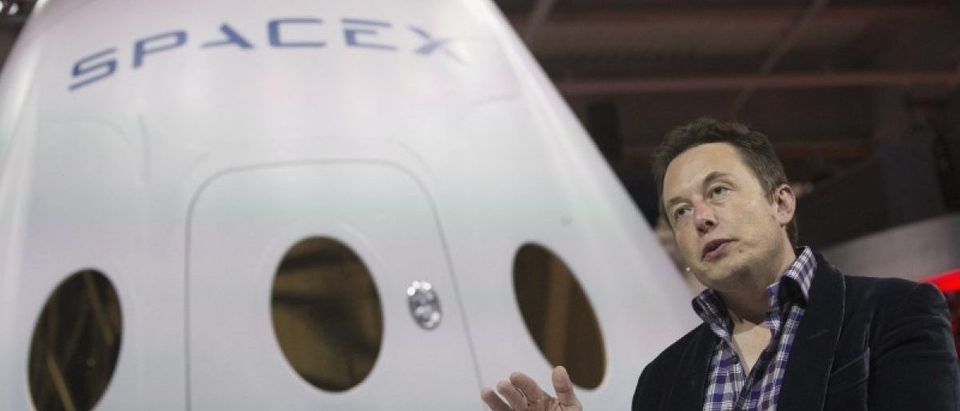SpaceX CEO Elon Musk no longer suspects sabotage was behind one of his rockets blowing up in September, but he still says SpaceX is vulnerable to attack by “a long list” of corporate adversaries.
Musk told representatives of the National Reconnaissance Office in a private meeting that the rocket probably wasn’t destroyed by sabotage, but was an accident. He stated, however, that SpaceX’s corporate enemies could resort to sabotage in the future.
“It might have been formation of solid oxygen in the carbon over-wrap of one of the [helium] bottles in the upper stage tanks,” according to an excerpt of Musk’s remarks. “If it was liquid, it would have been squeezed out. But under pressure it could have ignited with the carbon. This is the leading theory right now, but it is subject to confirmation.”
A spokesman for SpaceX declined to confirm or deny that the statements to SpaceNews after they were published anonymously online.
Industry experts believe the explosion could have been caused by anything from a fuel leak, unknown contaminants in the liquid oxygen propellant, or a problem with rocket staging.
Musk’s investigators took the prospect of sabotage very seriously earlier in October, going so far as attempting to access the roof of a nearby building owned by SpaceX’s business rival, United Launch Alliance (ULA). ULA is a joint venture between major aerospace defense contractors Lockheed Martin and Boeing. SpaceX had still images from video of the explosion that appeared to show unusual activity on the roof of a nearby building belonging to ULA.
ULA denied the SpaceX employee access to the roof, and instead called U.S. Air Force investigators, who inspected it, but didn’t find anything connecting it to the rocket explosion. SpaceX and ULA compete over lucrative national security contracts. ULA had a monopoly on those contracts for about a decade since it was the only launch provider certified by the U.S. Air Force.
Musk, will have a harder time finding new clients and is risking a serious financial loss with each new launch, potentially driving customers to ULA and SpaceX’s other business rivals.
SpaceX disrupted ULA’s market share, but Musk’s company suffered a major setback in early September when a Falcon 9 rocket exploded on the launch pad. The rocket was carrying a $200 million satellite to provide phone, video and internet services for the Middle East, Europe, and locations across sub-Saharan Africa.
The Space Frontier Foundation (SFF) estimated that SpaceX must spend $120 million to replace the lost rocket, factoring in future revenue from reusing the booster and the costs of repairing the launch pad. The company could also be hit with a $50 million dollar lawsuit from the telecommunications company whose satellite the rocket explosion destroyed. SpaceX declined to tell Forbes if SFF estimates were accurate.
SpaceX rockets have previously exploded several times during landing attempts, which Musk called a “huge blow.” Currently, SpaceX has nine more scheduled launches this year. After the company’s last launch failure, it took nearly six months before Falcon 9 launches were resumed. ULA employees have estimated that it could take up to a full year to resume launches.
Send tips to andrew@
All content created by the Daily Caller News Foundation, an independent and nonpartisan newswire service, is available without charge to any legitimate news publisher that can provide a large audience. All republished articles must include our logo, our reporter’s byline and their DCNF affiliation. For any questions about our guidelines or partnering with us, please contact licensing@dailycallernewsfoundation.org.


